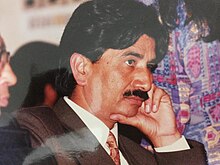Khalid Alvi
Khalid Alvi | |
|---|---|
 | |
| Born | 20 June 1962 Chandpur, Bijnor, Uttar Pradesh |
| Nationality | Indian |
| Alma mater | PhD (Delhi University) |
| Parent(s) | Late Malik Irfan Ahmad, Late Islama Khatoon |
Khalid Alvi also known as Khalid Mustafa Alvi is a professor at the University of Delhi, critic, and Urdu poet. He has written twelve books and edited the English journal Furtherance and the Urdu monthly Shahkaar.[citation needed] Some of his works have been translated into German, Persian and Uzbek Languages.
Early life and education
This section of a biography of a living person does not include any references or sources. (May 2013) |
Khalid Alvi received his early education in his home town Chandpur, Bijnor, Uttar Pradesh and then he joined the University of Delhi as a Research Scholar. During his stay at University of Delhi as a research scholar he was invited to deliver a series of lecture on Indian literature by Peshawar University, Oriental Institute Tashkent and some other Organisations in various parts of the world.
Career
This section of a biography of a living person does not include any references or sources. (May 2013) |
After Alvi finished his MPhil, he was offered an assistant professorship at the college of Delhi University.
Writing
One of Alvi's books, Aangarey, has been the subject of controversy. The book is a collection of Urdu short stories, first published in the 1930s, and then banned in 1933.[1] Alvi reissued the book in 1993, but, when doing so, had to excise major portions of it.[2]
Bibliography
References
- ^ Swami, Praveen (7 May 2013). "India's cricket god Dhoni and our crazed god squad". Firstpost World. Retrieved 29 May 2013.
- ^ Kumar, Girja (1997). The book on trial: fundamentalism and censorship in India. Har-Anand Publications. p. 124.
